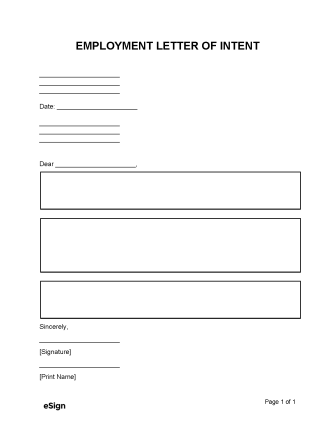

An employment (job) letter of intent is a document used by an individual to communicate interest in a particular position of employment at a company. Similar to a cover letter, an LOI allows the applicant to mention their qualifications and demonstrate their suitability as a candidate.
Aside from qualifications, the letter should include previous work experience, education, and skills that are applicable to the position. While these elements are also included in a resume or CV, a letter of intent is a more personalized document and enables the writer to express passion for the job and appreciation for the company and employer they wish to work for.
Letters of intent are most commonly used when an individual discovers a job opening they are passionate about or when they are interested in working for a particular company or employer. They are also suitable for situations when an employer is looking to hire but has yet to create a job posting.
In some cases, an employer might employ professionals in the applicant’s area of expertise, but they are only hiring for positions unrelated to the individual’s field. A letter of intent in this instance shows initiative and demonstrates how the applicant could fit in and add value to the company if a position opens up.
Some employers ask for letters of intent to be submitted during the application process. This is typically required only when companies are looking to hire high-level employees in executive and upper-management roles, specialized workers, and other important positions.
[SENDER NAME]
[SENDER STREET ADDRESS]
[SENDER CITY, STATE, ZIP]
[RECIPIENT NAME]
[RECIPIENT STREET ADDRESS]
[RECIPIENT CITY, STATE, ZIP]
Dear [MANAGER NAME] ,
My name is [APPLICANT NAME] , and I am very interested in working for your company, specifically in the position of [POSITION] . I have worked in the [FIELD OF WORK] field for [#] years, and I believe I would be a valuable addition to your team.
At my previous job, I was responsible for [DUTIES] and have learned [NEW SKILLS] . I believe this experience, in combination with my willingness to learn and ability to do so quickly, makes me a suitable candidate for [POSITION] .
I am very passionate about [FIELD OF WORK] and am a hard worker with excellent interpersonal skills. I gained a lot of knowledge from my former employer, but I am keen to learn more, and I believe your company will provide me with the opportunity to be a successful [JOB POSITION] .
You will find my full resume attached to this letter, and I would be happy to go over my qualifications in further detail and answer any questions you may have. I appreciate the time you have taken to read my letter and look forward to meeting in person and discussing this position.
Best regards,
[APPLICANT NAME]
What to include and exclude in a letter of intent will differ greatly depending on the applicant, the employer, the company, the type of industry, and other factors. All applicants looking to write a competent letter of intent would be wise to observe the following recommendations to maximize the effectiveness of the letter:
When applying for a job, it’s important to find out what forms and documentation will be required in addition to the letter of intent. Below is a list of common documents to include in an application.